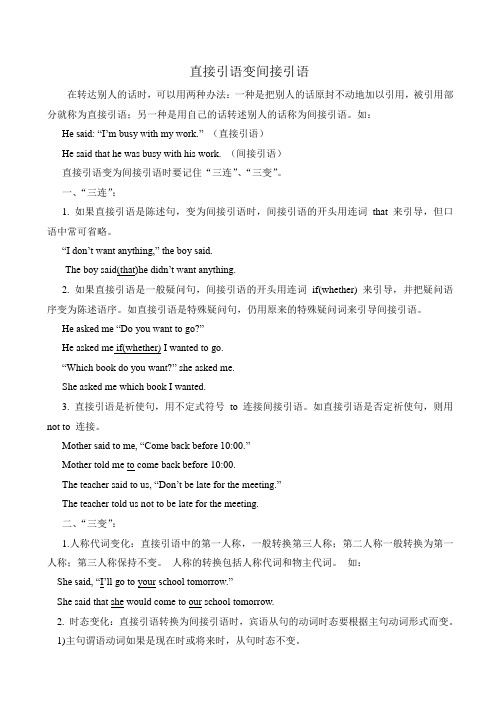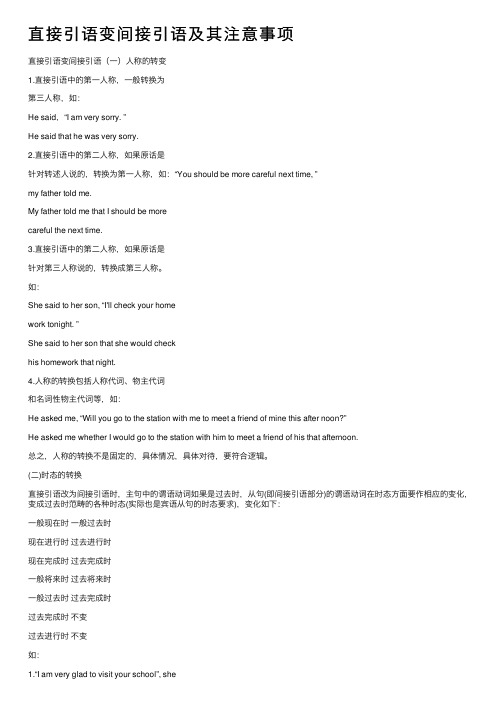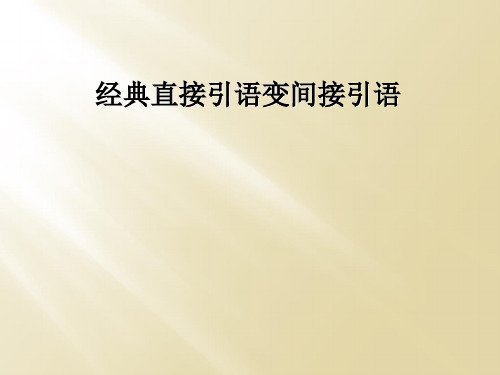直接引语变间接引语需注意的几种变化
直接引语和间接引语的转换

直接引语和间接引语的转换直接引语和间接引语是我们在日常生活中经常使用的两种引述方式。
直接引语是将别人的原话直接引用出来,用引号括起来;而间接引语是通过自己的表述方式来间接传达别人的原话。
在表达中,我们经常需要进行直接引语和间接引语的转换,以适应不同的情境和需要。
本文将探讨直接引语和间接引语的转换方法和要点。
1. 直接引语的转换为间接引语当我们需要将直接引语转换为间接引语时,需要注意以下几点:1.1改变人称和时态在转换为间接引语时,我们需要将直接引语中的人称和时态进行相应的改变。
例如,如果直接引语中的第一人称变成了第三人称,时态也要变化为与转述的时间点相符。
例子1:直接引语:他说:“我很喜欢这本书。
”间接引语:他说他很喜欢那本书。
1.2使用合适的引导动词和连词在引导直接引语变为间接引语时,我们需要使用合适的引导动词和连词,以使转述更加准确和连贯。
例子2:直接引语:她说:“我正在考虑是否要去旅行。
”间接引语:她说她正在考虑是否要去旅行。
2. 间接引语的转换为直接引语相比将直接引语转换为间接引语,将间接引语转换为直接引语则稍显复杂。
在进行转换时,需要注意以下要点:2.1恢复原话的语气和语态将间接引语转换为直接引语时,我们需要恢复原话的语气和语态。
这意味着使用引号将原话括起来,并使用准确的引述方式表达原话的内容。
例子3:间接引语:他说他会帮助我。
直接引语:他说:“我会帮助你。
”2.2注意引述方式和标点符号在转换为直接引语时,我们需要注意使用适当的引述方式和标点符号。
引述方式可以是引号括起来的原话,或者是以冒号引导的原话等。
例子4:间接引语:她说她很忙,没时间参加会议。
直接引语:她说:“我很忙,没时间参加会议。
”综上所述,直接引语和间接引语在书写和表达中起着重要的作用。
在进行转换时,需要注意改变人称和时态,使用合适的引导动词和连词,并恢复原话的语气和语态等要点。
通过掌握直接引语和间接引语的转换方法,我们可以更加准确地引用他人的观点,使表达更加清晰和有力。
直接引语变为间接引语的注意事项

直接引语变为间接引语一、定义直接引语:引述别人的原话。
被引用的部分放在引号里。
间接引语:用自己的话转述别人的话。
间接引语不用引号,在多数情况下是以宾语从句的形式出现的。
一、人称的变化如果直接引语的主语是第一人称,变为间接引语时,须和主句的主语保持一致;如果直接引语的主语是第二人称,变为间接引语时,须和主句的宾语保持一致;如果直接引语的主语是第三人称,变为间接引语时,人称不变。
直接引语变为间接引语时的人称变化e.g. (1) He said, “I like it very much.”→He said that he liked it very much.(2)The teacher said,“You are late.”→The teacher told me that I was late.(3)He said to me,“I’ve left my book in your room.”→He told me that he left his book in my room.二、时态的变化1 、如主句的谓语动词是一般过去时,直接引语变间接引语时,从句的谓语动词在时态方面要做相应的变化。
如主句的谓语动词是现在时,从句的时态无需变化。
间接引语时,时态不变。
e.g. (1) Mother said to me, “Seeing is believing.”→Mother told me that seeing is believing.三、时间状语的变化e.g. (1) He said, “It’s nine o’clock now.”→He said that it was nine o’clock then.(2)He said, “My sister was here three days ago.”→He said that his sister had been there three days before/earlier.(3)He said, “They will arrive the day after tomorrow.”→He said that they would arrive in two days’ time.直接引语变为间接引语时的指示代词、地点状语和动词变化→She said that she had gone there to the doctor two days before/earlier.注意:1、如果转述自己的话,第一人称则不变;转述原地发生的事,here不变成there;转述当天的事情,yesterday, tomorrow, this evening等时间状语不变。
直接引语变间接引语

直接引语变间接引语在转达别人的话时,可以用两种办法:一种是把别人的话原封不动地加以引用,被引用部分就称为直接引语;另一种是用自己的话转述别人的话称为间接引语。
如:He said: “I’m busy with my work.” (直接引语)He said that he was busy with his work. (间接引语)直接引语变为间接引语时要记住“三连”、“三变”。
一、“三连”:1. 如果直接引语是陈述句,变为间接引语时,间接引语的开头用连词that 来引导,但口语中常可省略。
“I don’t want anything,” the boy said.The boy said(that)he didn’t want anything.2. 如果直接引语是一般疑问句,间接引语的开头用连词if(whether) 来引导,并把疑问语序变为陈述语序。
如直接引语是特殊疑问句,仍用原来的特殊疑问词来引导间接引语。
H e asked me “Do you want to go?”He asked me if(whether) I wanted to go.“Which book do you want?” she asked me.She asked me which book I wanted.3. 直接引语是祈使句,用不定式符号to连接间接引语。
如直接引语是否定祈使句,则用not to 连接。
M other said to me, “Come back before 10:00.”Mother told me to come back before 10:00.The teacher said to us, “Don’t be late for the meeting.”The teacher told us not to be late for the meeting.二、“三变”:1.人称代词变化:直接引语中的第一人称,一般转换第三人称;第二人称一般转换为第一人称;第三人称保持不变。
直接引语变间接引语的五点变化

直接引语变间接引语的五点变化1.时态变化直接引语变为间接引语时,若主句为过去时态,变为间接引语的宾语从句的时态如下表:直接引语间接引语一般现在时一般过去时一般过去时过去完成时一般将来时过去将来时现在进行时过去进行时现在完成时过去完成时过去完成时过去完成时(不变)过去进行时过去进行时(不变)can couldmay mightmust must/ had toeg: "l like English very much,"he said. 他说:“我很喜欢英语。
” →He said that he liked English very much.He said, "It would rain soon." 他说:“很快就会下雨。
” →He said that it would rain soon.注意:[1] 若直接引语为客观真理,则变为间接引语时时态不变:The teacher said to us,"Knowledge is power."老师对我们说:“知识就是力量” →The teacher told us that knowledge is power.[2]有时由于直接引语有特定的过去时态状语,变为间接引语时时态也可不变:He said that his daughter was born in 1997."他说:“我的女儿是1997年出生的。
” →He said that his daughter was born in 1997.2时间状语,地点状语,指示代词和动词的变化直接引语变为间接引语时,有些时间状语,地点状语,指示代词和动词也要作相应的变动。
直接引语间接引语时间状语now 现在then 那时;当时时间状语today 今天that day 那天时间状语tonight 今晚that night 那天晚上时间状语this week 本周that week 上周时间状语yesterday 昨天the day before前一天时间状语the day beforeyesterday 前天two days before 前两天时间状语two days ago 两天前three days before 三天前时间状语last week 上周the last week 前一周时间状语tomorrow 明天the next day 第二天时间状next week 下周the next week 第二个语星期this 这that 那指示代词these 这些those 那些指示代词here 这里there 那里地点状语动词come 来go 去注:直接引语转换成间接引语时的变化应视实际情况而定。
直接引语与间接引语的转换

直接引语与间接引语的转换在日常交流中,人们常常使用直接引语和间接引语来传递别人的言论或思想。
直接引语是指以原话形式进行传递,使用引号将其包裹起来;而间接引语则是以自己的表达方式来转述别人的话语。
掌握好直接引语和间接引语的转换技巧是写作和口语表达的基本要求之一。
直接引语转换为间接引语时,需要注意以下几点:1. 时态的变化:直接引语通常使用现在时,当转换为间接引语时,根据上下文需要,可以根据一般现在时、一般过去时、现在进行时、过去进行时来进行转换。
例如:- 直接引语:She said, "I am going to the park."间接引语:She said that she was going to the park.- 直接引语:Tom said, "I will come tomorrow."间接引语:Tom said that he would come the next day.2. 人称的变化:在转换为间接引语时,第一人称称代词通常会变为第三人称称代词。
例如:- 直接引语:John said, "I am happy."间接引语:John said that he was happy.3. 时间和地点的变化:当直接引语中涉及到具体的时间和地点时,在转换为间接引语时需相应地变化。
例如:- 直接引语:Mary said, "I will meet you here at 5 pm."间接引语:Mary said that she would meet me there at 5 pm.4. 情态动词的变化:当直接引语中含有情态动词时,需要根据情况进行相应的转换。
例如:- 直接引语:He said, "I can swim."间接引语:He said that he could swim.- 直接引语:She said, "I must leave now."间接引语:She said that she had to leave then.除了上述常用的转换规则,还有一些特殊情况需要注意。
英语直接引语变间接引语的讲解

英语直接引语变间接引语的讲解
将英语直接引语转换为间接引语需要进行几个关键步骤,主要包括缩进、时态和人称的转换。
以下是详细的讲解:
1. 缩进:在直接引语转变为间接引语时,通常需要从第二行开始缩进。
通常使用两个或更多的空格或制表符来实现这一目的。
2. 时态:通常来说,间接引语中的时态应与主要句子的时态一致。
例如,如果主句使用一般现在时,间接引语也应当使用一般现在时。
然而,如果直接引语中的动作发生在过去,并且与主句的动作发生在同一时间,间接引语可以使用过去进行时来代替过去时态。
3. 人称:在直接引语转变为间接引语时,人称需要进行相应的转换。
例如,直接引语中的“I”在间接引语中应变为“he”或“she”。
4. 指示词和动词:指示词如“this”和“that”在直接引语转变为间接引语时通常需要省略。
此外,动词如“say”和“tell”在间接引语中通常可以省略,除非它们在句子中起到其他作用。
5. 标点符号:在直接引语转变为间接引语时,标点符号也需要进行相应的转换。
例如,直接引语的句号在间接引语中应变为逗号,而直接引语的感叹号在间接引语中应变为句号。
以下是一个示例:
直接引语:“I love you!”he said.
间接引语:“He said that he loved me.”
在这个例子中,我们可以看到“I”被转换为“he”,“said”被省略了,同时指示词“that”被添加到了句子中。
此外,“!”也被省略了,取而代之的是句号。
希望这个讲解能帮助你更好地理解如何将英语直接引语转换为间接引语。
直接引语改间接引语方法

直接引语改间接引语方法
1. 将直接引语改为间接引语时,需要注意人称、动词时态、时态、代词和时间副词
的变化。
一般来说,直接引语中的第一人称(我、我们)会改为第三人称(他、她、他们),第二人称(你、你们)会改为第三人称或者不变,动词时态会根据实际情况进行调整,时
间副词也会根据需要进行适当的改变。
2. 对于陈述句,可以使用“说”、“告诉”等动词来引导间接引语。
“他说:‘我
很忙’”可以改为“他说他很忙”。
5. 注意将直接引语的引号去掉,并且将整个句子变为一个完整的陈述句。
6. 如果直接引语中有特殊的词汇、口语表达或者省略的部分,需要根据上下文进行
恰当的补充或改写。
7. 在间接引语中,人名、地名等具体代词通常不需要改变。
只有第一人称和第二人
称需要根据情况进行调整。
8. 当直接引语中包含时间、地点或其他具体细节时,需要根据需要进行相应的修改。
“他说:‘我明天要去北京’”可以改为“他说他明天要去北京”。
9. 在改写间接引语时,需要注意准确传递原始信息,并保持句子的逻辑结构和一致性。
10. 读者在阅读间接引语时应能够理解原始信息,并感受到作者尝试传达这些信息的
方式和意图。
间接引语改写的方法应根据上下文和作者的意图进行恰当的调整。
直接引语变间接引语的几种变化及举例

直接引语变间接引语的几点变化一、时态的变化直接引语变为间接引语时,若主句为过去时态,变为间接引语的宾语从句通常要将时态往后推一个,即一般现在时变为一般过去时,一般将来时变为过去将来时,现在进行时变为过去进行时,现在完成时变为过去完成时,一般过去时也变为过去完成时,等等(若直接引语为过去完成时,变为间接引语可以不变)。
另外,若直接引语中有情态动词can, may等,也应变成过去式could, might等(情态动词mu st可以变为had to,也可不变,should, ought to, had better 等可以不变)。
如:“I like to watch TV,” she said. 她说:“我喜欢看电视。
”→She said that she liked to watch TV. 她说她喜欢看电视。
He said, “I’m waiting for her.” 他说:“我在等她。
”→He said that he was waiting for her. 他说他在等她。
“It will rain soon,” he said. 他说:“很快就会下雨。
”→He said that it would rain soon. 他说很快就会下雨。
“She can swim,” he said. 他说:“她会游泳。
”→He said that she could swim. 他说她会游泳。
注意:(1)若直接引语为客观真理,则变为间接引语时时态不变:The teacher said, “The earth turns around the sun.” 老师说:“地球绕着太阳转。
”→The teacher said that the earth turns around the sun. 老师说地球绕着太阳转。
(2)有时由于直接引语有特定的过去时间状语,变为间接引语时时态也可不变:He said, “ was born in 1954.” 他说:“我是1954年生的。
直接引语与间接引语的转换技巧

直接引语与间接引语的转换技巧在日常生活和学术写作中,我们经常会用到直接引语和间接引语来引述他人的话语或观点。
直接引语是将别人的原话直接引用,而间接引语是将别人的原话进行转述。
正确地使用直接引语和间接引语是写作中必不可少的技巧,本文将介绍一些转换技巧,并举例说明其正确应用。
一、直接引语的转换1. 改变人称和时态当将直接引语转换为间接引语时,要注意改变人称和时态。
一般来说,第一人称要转换为“第三人称”,现在时要转换为“过去时”。
例如,直接引语:“I love reading.”(我喜欢阅读。
)间接引语:“She said that she loved reading.”(她说她喜欢阅读。
)2. 改变时间和地点状语在转换为间接引语时,也要对时间和地点状语进行相应的改变。
例如,直接引语:“He said, 'I will go to the library tomorrow.'”(他说:“我明天会去图书馆。
”)间接引语:“He said that he would go to the library the next day.”(他说他会在第二天去图书馆。
)3. 注意连接词的变化在转换为间接引语时,需要注意连接词的变化。
例如,“I think”可以改为“I thought”或“he thought”。
例如,直接引语:“She said, 'I think it's a good idea.'”(她说:“我认为这是个好主意。
”)间接引语:“She said that she thought it was a good idea.”(她说她认为这是个好主意。
)二、间接引语的转换1. 恢复直接引语的原貌有时候,在间接引语中需要恢复原引语的直接引语形式。
例如,直接引语:“He told me, 'I will come tomorrow.'”(他告诉我:“我明天会来。
直接引语和间接引语的几点变化

直接引语和间接引语的几点变化
一、时态变化
如果引述动词为过去时态,间接引语中的时间就要往后推,即现在时间推至过去时间,过去时间推至过去的过去,将来时间推至过去将来时间。
具体变化见下表:
二、情态动词的变化
在间接引语中,有些情态动词没有过去式,转换为间接引语时仍用原来的形式,或用其它表示法。
四、引述动词的变化
为了让表达更丰富多彩一些,引述动词除了常见的tell,ask,say外,根据不同句式还
人称的变化——“一主、二宾、三不变”。
意为在改为间接引语时,直接引语里的第一人称。
直接引语变间接引语及其注意事项

直接引语变间接引语及其注意事项直接引语变间接引语(⼀)⼈称的转变1.直接引语中的第⼀⼈称,⼀般转换为第三⼈称,如:He said,“I am very sorry. ”He said that he was very sorry.2.直接引语中的第⼆⼈称,如果原话是针对转述⼈说的,转换为第⼀⼈称,如:“You should be more careful next time, ”my father told me.My father told me that I should be morecareful the next time.3.直接引语中的第⼆⼈称,如果原话是针对第三⼈称说的,转换成第三⼈称。
如:She said to her son, “I'll check your homework tonight. ”She said to her son that she would checkhis homework that night.4.⼈称的转换包括⼈称代词、物主代词和名词性物主代词等,如:He asked me, “Will you go to the station with me to meet a friend of mine this after noon?”He asked me whether I would go to the station with him to meet a friend of his that afternoon.总之,⼈称的转换不是固定的,具体情况,具体对待,要符合逻辑。
(⼆)时态的转换直接引语改为间接引语时,主句中的谓语动词如果是过去时,从句(即间接引语部分)的谓语动词在时态⽅⾯要作相应的变化,变成过去时范畴的各种时态(实际也是宾语从句的时态要求),变化如下:⼀般现在时⼀般过去时现在进⾏时过去进⾏时现在完成时过去完成时⼀般将来时过去将来时⼀般过去时过去完成时过去完成时不变过去进⾏时不变如:1.“I am very glad to visit your school”, shesaid.She said she was very glad to visit ourschool.2.Tom said, “We are listening to the pop music. ”Tom said that they were listening to the pop music.3.Mother asked, “Have you finished your homework before you watch TV?”Mother asked me whether I had finished my homework before I watched TV.4.He asked the conductor, “Where shall I get off to change to a No. 3 bus?”He asked the conductor where he would get off to change to a No. 3 bus.5.“Why did she refuse to go there?”the teacher asked.The teacher asked why she had refused to go there.6.Mother asked me, “Had you finished your homework before you watched TV?”Mother asked me whether I had finished my homework before I watched TV.7.Tom said, “We were having a football match this time yesterday. ”Tom said that they were having a football match that time the day before.8.He said,“I haven't heard from my parents these days. ” He said that he hadn't heard from his parents those days.(三)时间状语、地点状语的变化1.直接引语是客观事实、普遍真理等,主句尽管是过去时态,变成间接引语时,时态仍然⽤⼀般现在时态。
直接引语和间接引语的转换方法

直接引语和间接引语的转换方法直接引语和间接引语是英语中常见的两种引述方式。
直接引语是将某人的原话直接用引号括起来,而间接引语则是将他人的话转述出来。
在英语写作中,我们经常需要进行直接引语和间接引语的转换。
本文将介绍关于直接引语和间接引语的转换方法。
一、直接引语的转换为间接引语当我们需要将直接引语转换为间接引语时,需要注意以下几点:1. 主要变化:将引号去掉,改为使用"that"引导从句。
例如:直接引语:“I am going to the park,” she said.间接引语:She said that she was going to the park.2. 时态变化:根据引语所表示的时间改变时态。
例如:直接引语:“I am studying English,” he said.间接引语:He said that he was studying English.3. 人称变化:根据引语所表示的人称改变人称。
例如:直接引语:“I will help you,” he said.间接引语:He said that he would help me.4. 指示变化:根据引语中的指示词改变指示词。
例如:直接引语:“This is a book,” she said.间接引语:She said that that was a book.5. 修饰变化:根据引语中的修饰词改变修饰词。
例如:直接引语:“I love this beautiful city,” she said.间接引语:She said that she loved that beautiful city.二、间接引语的转换为直接引语当我们需要将间接引语转换为直接引语时,需要注意以下几点:1. 去除“that”:将从句中的"that"去除。
例如:间接引语:She said that she was busy.直接引语:“I am busy,” she said.2. 时态变化:根据引语所表示的时间改变时态。
中的直接引语和间接引语的转换规则

中的直接引语和间接引语的转换规则直接引语和间接引语是在口语交流和书面表达中常常用到的两种表达方式。
在转换直接引语为间接引语时,需要遵循一定的规则和变化方式。
本文将介绍中的直接引语和间接引语的转换规则,并提供一些例子进行说明。
一、直接引语的转换为间接引语1. 时态变化:当直接引语是表示客观事实、科学真理和普遍规律时,时态通常不发生变化。
例如:直接引语:他说:“地球是圆的。
”间接引语:他说地球是圆的。
当直接引语是表示过去或未来的具体动作或状态时,需要根据上下文和引述的时间关系进行时态的调整。
例如:直接引语:他说:“我去过北京。
”间接引语:他说他曾经去过北京。
直接引语:她说:“明天我会去上海。
”间接引语:她说她明天会去上海。
2. 人称变化:当直接引语中包含第一人称或第二人称时,需要根据引述的人称关系进行适当变化。
例如:直接引语:他对我说:“我喜欢你。
”间接引语:他对我说他喜欢我。
直接引语:她对她说:“你做得很好。
”间接引语:她对她说她做得很好。
3. 指示代词和时间状语的变化:当直接引语中包含指示代词或时间状语时,需要根据引述的情境进行相应的变化。
例如:直接引语:他说:“这本书是我的。
”间接引语:他说那本书是他的。
直接引语:他说:“我明天去看电影。
”间接引语:他说他明天去看电影。
二、间接引语的转换为直接引语1. 时态变化:当从间接引语转换为直接引语时,通常需要将时态变为与引述者当前说话时所处的时态一致。
例如:间接引语:他说他明天会去上海。
直接引语:他说:“我明天会去上海。
”2. 人称变化:当从间接引语转换为直接引语时,通常需要将人称变为与引述者当前说话时所处的人称一致。
例如:间接引语:他对我说他喜欢我。
直接引语:他对我说:“我喜欢你。
”3. 指示代词和时间状语的变化:当从间接引语转换为直接引语时,通常需要将指示代词和时间状语变为与引述者当前说话时所处的情境一致。
例如:间接引语:他说那本书是他的。
直接引语:他说:“这本书是我的。
经典直接引语变间接引语

讲解注意点
直接引语变间接引语要注意以下 变化。
• 连接词 • 语序 • 时态 • 指代(人称、指示代词、时间状
语和地点状语)
注意连接词的变化
1.直接引语为陈述句,用that做连接词。 • He said, “Jim likes it very much.” • → He said that he liked it very much. 2.直接引语为一般疑问句,用if或wether做连接词。
you for a long time.” →Mr Smith said to his girl friend that he had not seen her for a long time.
直接引语改变为间接引语
2、直接引语如果是一般疑问句,变为间接引语时,需用从 属连接词whether或if引导,词序要改变。 Lily said to Miss Green, "Is it made in China?”
• →He asked his little sister not to cry any more.
What did Garfield say?
I’m lazy. He said he was lazy.
I’m hard-working sometimes. He said he was hard-working sometimes. I’m good at riding motorbikes. He said he was good at riding motorbikes. I’m better at dancing than singing.
He said he was better at dancing than singing.
直接引语变为间接引语的注意事项

直接引语变为间接引语一、定义直接引语:引述别人的原话。
被引用的部分放在引号里。
间接引语:用自己的话转述别人的话。
间接引语不用引号,在多数情况下是以宾语从句的形式出现的。
一、人称的变化如果直接引语的主语是第一人称,变为间接引语时,须和主句的主语保持一致;如果直接引语的主语是第二人称,变为间接引语时,须和主句的宾语保持一致;如果直接引语的主语是第三人称,变为间接引语时,人称不变。
直接引语变为间接引语时的人称变化e.g. (1) He said, “I like it very much.”→He said that he liked it very much.(2)The teacher said,“You are late.”→The teacher told me that I was late.(3)He said to me,“I’ve left my book in your room.”→He told me that he left his book in my room.二、时态的变化1 、如主句的谓语动词是一般过去时,直接引语变间接引语时,从句的谓语动词在时态方面要做相应的变化。
如主句的谓语动词是现在时,从句的时态无需变化。
间接引语时,时态不变。
e.g. (1) Mother said to me, “Seeing is believing.”→Mother told me that seeing is believing.三、时间状语的变化e.g. (1) He said, “It’s nine o’clock now.”→He said that it was nine o’clock then.(2)He said, “My sister was here three days ago.”→He said that his sister had been there three days before/earlier.(3)He said, “They will arrive the day after tomorrow.”→He said that they would arrive in two days’ time.直接引语变为间接引语时的指示代词、地点状语和动词变化→She said that she had gone there to the doctor two days before/earlier.注意:1、如果转述自己的话,第一人称则不变;转述原地发生的事,here不变成there;转述当天的事情,yesterday, tomorrow, this evening等时间状语不变。
直接引语变为间接引语要注意的几个问题

直接引语和间接引语Direct and Indirect Speech直接引语变为间接引语要注意的几个问题:一.时态问题一、如果主句谓语动词为各种现在时或一般将来时,则间接引语中的动词仍保持直接引语的原来时态。
例如:例句:1)He says, “I am very busy today.”He says that he is very busy today.2)He will say, “ I have watered the flowers.”He will say that he has watered the flowers.二、如果主句的谓语动词是过去时态,直接引语变为间接引语时,从句谓语动词的时态通常要作相应的变化。
规则如下(时态呼应)直接引语间接引语一般现在时一般过去时现在进行时过去进行时一般将来时过去将来时现在完成时过去完成时一般过去时过去完成时过去完成时过去完成时例句:1)一般完成时变为过去完成时She said, “China has been using PSAs to educate people.”She said that China had been using PSAs to educate people.2)现在进行时变为过去进行时He said, “I am doing my homework at 9 o’clock yesterday.He said that he was doing homework at 9 o’clock the day before.3)现在进行时变为过去进行时He said, ”I’m leaving for Beijing this afternoon.”He said that he was leaving for Beijing that afternoon.4)现在完成时变为过去完成时“I have received the letter,” Tom said to me.Tom said to me that he had received the letter.5)过去时变为过去完成时She said, “I went to Paris last year.”She said that she had gone to Paris the year before.6)过去完成时变为过去完成时She said, “I had already finished the project.”She said that she had already finished the project.特殊情况:1 .直接引语表述的是客观真理,变为间接引语时,时态不变例句:1) The geography teacher said,“The sun rises in the east and sets in the west.”The geography teacher told us that the sun rises in the east and sets in the west.2) He said, “ Magnet (磁铁) attracts iron.”He said that magnet attracts iron.2. 如果直接引语所表述的内容在目前和说话时同样有效,变间接引语时,时态可不变例句:1) The children said, “We love this game.”They told us that they love that game.2) He said, “I was born in 1990.”He said that he was born in 1990.二.代词等的变化指示代词:This变成that These变those表地点的词:Here变there表示时间的词:Now变thentoday变成that dayyesterday 变the day beforetomorrow变the next daynext week/month/year变the next week/month/yearlast year 变the year before或者the previous yearThree days ago变three days before动词:come 变go陈述句(statements)变为以that 引导的宾语从句(陈述句序),例如:tell, say,advise,agree,explain,insist,promise,warn,remind,suggest 例句:1.She said, “Our train will arrive in five minutes.”She said (that) their train would arrive in five minutes.一般疑问句变成if (whether是否) 引导的宾语从句例句:1)He said, “ Can you swim, John?”He asked John if/whether he could swim特殊疑问句变为由who, what, when,why,who,how 等疑问词引导的宾语从句。
- 1、下载文档前请自行甄别文档内容的完整性,平台不提供额外的编辑、内容补充、找答案等附加服务。
- 2、"仅部分预览"的文档,不可在线预览部分如存在完整性等问题,可反馈申请退款(可完整预览的文档不适用该条件!)。
- 3、如文档侵犯您的权益,请联系客服反馈,我们会尽快为您处理(人工客服工作时间:9:00-18:30)。
北京四中撰稿:徐正海编审:贾巍责编:任淑弘直接引语变间接引语需注意的几种变化在日常交际中,我们经常会遇到需要引用或转述别人的话的情况。
引述别人的话一般采用两种方式:一种是原封不动地引述别人的话,并将它放在引号内,称为直接引语(Direct Speech);另一种是转述别人的话,被转述的话不放在引号内,称为间接引语(Indirect Speech)。
在把直接引语变为间接引语时,原来直接引语中的人称、时态、状语、句式及主谓语序都要作相应改变。
一、注意人称的变化:1、如果从句中的主语是第一人称或被第一人称所修饰。
变为间接引语后从句中的人称要与主句中主语的人称相一致:例如:She said,“My brother wants to go with me”.→She said her brother wanted to go with her.2、如果从句中的主语及宾语是第二人称,或被第二人所修饰。
从句中的人称要跟主句的宾语一致。
例如:He said to his friend, “How is your study now?”→He asked his friend how his study was then.3、如果从句中的主语及宾语是第三人称或被第三人称所修饰时,一般不需要变化。
例如:Mr. Wang said, “Li Lei is a good student.”→Mr. Wang said Li Lei was a good student.二、注意时态的变化与一致:直接引语在改为间接引语时,时态需要做相应的调整:例如:1) She said,“I lost a pen yesterday.”→She said she had lost a pen the day before.2) Lily said,“I will go to see my parents during the holiday. ”→Lily said she would go to see her parents during the holiday.但以下几种情况,当直接引语变为间接引语时,从句的时态不需要变化。
1)引语部分是客观真理。
The teacher told us, “Light travels faster than sound.”→The teacher told us light travels faster than sound.2)直接引语中有过去的具体时间(年、月、日),在变为间接引语时,从句的时态不变。
如:Jack said. “I went to China in 2006. ”→Jack said he went to China in 2006.三、注意时间、地点状语、指示代词以及方向动词的变化:由于说话人在转述别人的话时,所处的时间、地点等都发生了变化,因此,在变直接引语为间接引语时,其中涉及到的时间、地点以及相关的动词都相应的加以变化。
常见的变化词有:now→ then, today→ that day, tonight→ that night,here→ there; come →go, this→ that, these →those等。
例如:Li Lei said, “These books are mine.”→Li Lei said those books were his.但转述的内容如发生在当天,从句的时间状语可不变。
例如:Mary said, “I will come to visit you tonight.”→Mary said she would come to visit me that night.四、注意句型的特点及变化:1、直接引语是陈述句时,间接引语是由连词that引导的宾语从句,that常可省略。
当主句中出现say to sb. 时,可根据需要改为tell sb.。
例如:1) The guide said, “Our bus will arrive in five minutes.”→The guide said that their bus would arrive in five minutes.2) She said to me, “Li Lei has tried his best these days.”→She told me that Li Lei had tried his best those days.2、直接引语如果是一般疑问句,间接引语应改为由whether或if引导的宾语从句,此时谓语动词多用ask。
例如:1) He said, “Can you speak Japanese, Chen Lei? ”→He asked Chen Lei if / whether he could speak Japanese.2) My teacher said to me, “Do you go to school by bus?”→My teacher asked me if / whether I went to school by bus.3、直接引语如果是特殊问句,间接引语应该改为由疑问代词或疑问副词引导的宾语从句(宾语从句必须用陈述句语序)。
She asked me, “When do you have your dinner? ”→ She asked me when I had my dinner.4、直接引语如果是祈使句,间接引语应改为:“tell(ask, order等) sb. (not) to do sth.”句型。
例如:1) She said to the children, “Don’t run in the room.”→She told / asked the children not to run in the room.2) “Pass me that dictionary, please,” said she.→She asked me to pass her that dictionary.5、如直接引语是由let引导的祈使句,改为间接引语用时多用“should+动词原形”的句式。
例如:He said, “Let’s go to climb the mountains.”→He suggested that they should go to climb the mountains.专项练习:将下列句子变为间接引语:1. “You should come to school earlier next time,”his teacher said to Li Lei.2. Mr. Li said to me, “I will go to Shanghai on business next month.”3. “I haven’t heard from my friends these days,”said Tom.4. She said to him, “It’s time for you to leave.”5. Zhang Hong said to me, “I began to work here in 1988.”6. John said to his classmates, “I have learned 1,000 English words.”7. He said, “Do you enjoy living here?”8. “Have you anything interesting to read?”she said.9. “What did you do the day before yesterday?”the son asked his father.10. She said, “Did you meet this man at the station yesterday, Mr. Li?”11. “Open your books,”the teacher said to us.12. “Please come here to get your bike tomorrow,”the policeman said to her.13. “Let’s go to the zoo next Monday,”he said.14. “Don’t talk loudly in the reading room,”said the teacher.15. “What are you going to do with these materials, George?” he asked.专项练习参考答案:1. His teacher told Li Lei that he should go to school earlier the next time.2. Mr. Li told me that he would go to Shanghai on business the next month.3. Tom said that he hadn’t heard from his friends those days.4. She told him that it was time for him to leave.5. Zhang Hong told me that he began to work there in 1988.6. John told his classmates that he had learned 1,000 English words.7. He asked if I enjoyed living there.8. She asked if I had something interesting to read.9. The son asked his father what he had done two days before.10. She asked Mr. Li if he had met that man at the station the day before.11. The teacher told us to open our books.12. The policeman asked her to go there to get her bike the next day.13. He suggested that they should go the zoo the next Monday.14. The teacher asked the students not to talk loudly in the reading room.15. He asked George what he was going to do with those materials.。
